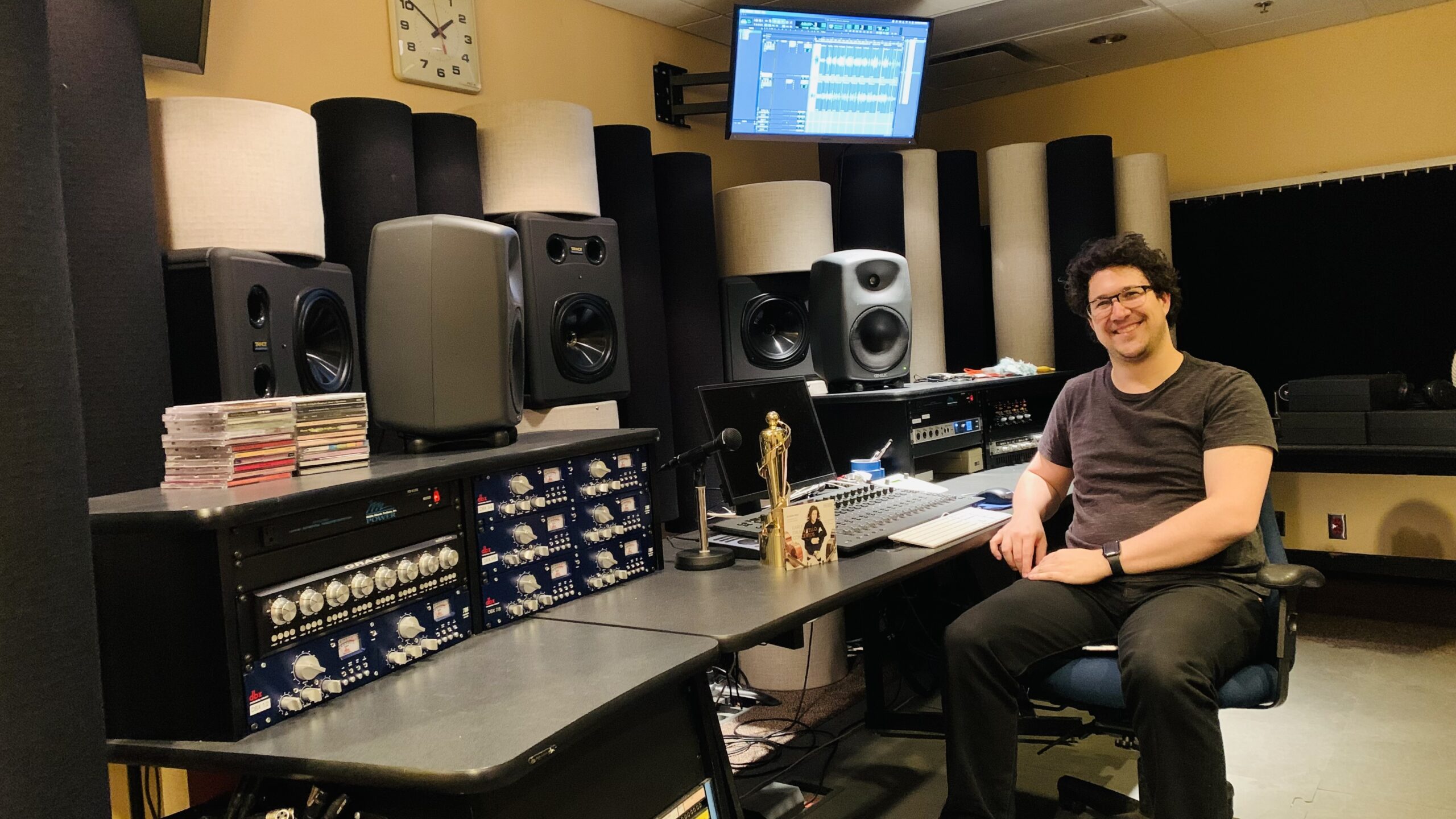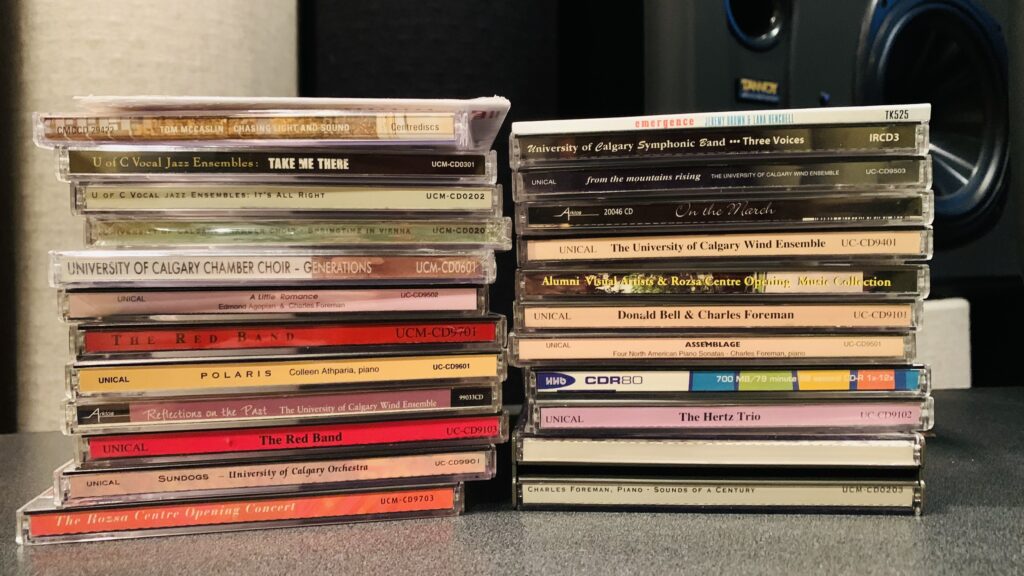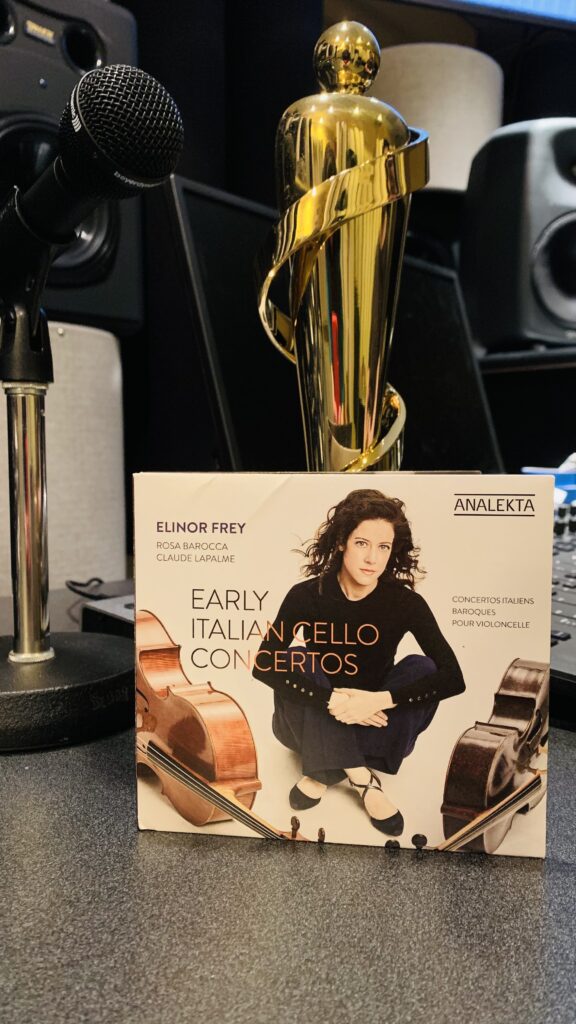An Interview with Alex Bohn, Head Audio Technical and Recording Engineer, U of C

For the past three seasons, Alex has provided audio and video recording for nearly every Calgary Pro Musica concert. He was the Assistant Sound Engineer in Elinor Frey’s Juno Award-winning album “Early Italian Cello Concertos” which was recorded in the Eckhardt-Gramatté Hall. CPM’s Community Engagement Manager Lisa Tkalych interviewed Alex earlier this month. Read about Alex’s experiences making this special album and his behind-the-scenes work with Calgary Pro Musica’s visiting artists.
Q: How has your studio changed since you started working at the University of Calgary?
A: When I first started in June 2021, the studio was completely different than how you see it now. The Rozsa Centre opened in 1997; this recording control area and most of the equipment dated back to 1999. It was not operational, and a lot of the equipment was early digital tape from c. 1999 when it was built. So you would record on these massive hard drives. Today you have a computer, but they didn’t really have a computer and were doing all the recording straight to a hard drive. I don’t think it had been used for at least a decade because it was only set up for tapes. I came in and everything was covered in dust. I think they were just using it as a classroom every couple of years. I knew Elinor’s recording session was coming up in September 2021, so I had to rush to put everything together at the time. I was given a certain budget to make this more of a thing and actually usable. I call it “Studio Rozsa.”

Stacks of all the cds recorded in the Eckhardt-Gramatté Hall
Q: Was there recording in the Eckhardt-Gramatté Hall before you arrived?
A: There was, but people would have to bring in their own equipment. They couldn’t just show up and record. They’d have to push everything off this desk and set up. Here is a photo of cds that have been recorded in the Eckhardt-Gramatté Hall including one by Tom McCaslin, principal tubist for the Calgary Phil. More recently, Kevin Chen and the Land’s End Ensemble have recorded here. The Lead Recording Engineer for Elinor’s cd brought loads of stuff and had to set it all up.
Q: Why did Elinor choose to use the Eckhardt-Gramatté Hall?
A: It’s a funny story. Originally Elinor and her team were going to record at the Banff Centre, but during the pandemic the Banff Centre laid everybody off. Though people started coming back to the Banff Centre in 2021, the option to record there didn’t pan out. Elinor’s team was looking for alternative venues. She had already arranged to do the recording with Rosa Barocca. The baroque orchestra’s conductor and Artistic Director Claude Lapalme offered the Rozsa Centre up as an alternative venue and it just kind of happened. The timing was right.
Q: Is this the first Juno award-winning album that was recorded here?
A: Yes.
Q: Do you remember the experience? Had you recorded other CDs before?
A: Yes. I’ve recorded other CDs with James Clemens-Seely, the head engineer for this recording and the former Senior Recording Engineer at Banff Centre. Their producer came from Montreal. I think it was a kind of right place, right time, right people because it takes everybody working together as a team effort.
Q: Did you realize at the time that it was a special recording?
A: Not at the time. The studio was just half put together, so I was stressed about just making sure everything was working, that signals were going where they needed to. It wasn’t until the CD was released and I got to listen to it for the first time. On that first track, I was like, “Oh, wow. Okay.” It turned out great.

Alex’s Work as Audio and Recording Engineer for Calgary Pro Musica
Q: Since June 2021, what percentage of the Calgary Pro Musica concerts have you worked as the Lead Sound Engineer?
A: Probably I’ve missed only two or three concerts.
Q: What do you think is special about Calgary Pro Musica?
A: The quality of the groups and consistency. A big part is knowing that when you’re coming to see the Calgary Pro Musica’s concerts, it’s going to be good music. I like how intimate chamber music concerts are because it feels a lot more just connected to the audience.
Q: What have your favourite concerts been this season?
A: I was really looking forward to the Danish String Quartet’s Monday, February 12 concert with folk music; I’ve listened to their album. There have been ones like bassist Xavier Foley [January 8, 2024] where I was really blown away by the talent. It was incredible, and I was not expecting that at all. Two years ago the Manhattan Chamber Players came in with a piano trio. And I thought that was really, really great. String quartets are probably one of my favourite kind of chamber ensembles.
Q: What interactions do you have with the musicians?
A: Usually I’m the first person in the hall that they see. I’m the one showing them the green room, introducing them to the space, introducing them to the hall, making sure that they have everything they need on stage. I’m also working with them, some more than others, to get the sound that they want in the hall. We have curtains that can go up and down that can change how reverberant the space is. Certain ensembles like it really nice and reverberant. Others want a little less, maybe a little more intimate and drier. It depends on the musicians and the ensemble. If they’re playing a lot of really fast-paced and staccato notes, we really need to hear the individual notes. You definitely want a drier sound so you can hear everything as clearly as possible.
Q: What do most ensembles request in terms of curtains/acoustics?
A: With the Danish String Quartet which was nearly sold out both nights, I had the baffles [curtains] all the way up so it was as reverberant as the hall can be. There were almost 380 people in the hall absorbing the sound. All of the other groups this season – the Israeli Chamber Project, Ensemble Phoenix Munich, Gryphon Trio and Xavier Foley – have had it half baffles or “half baff”: with one layer of the curtains up, the other down. I’d be curious to know if the patrons can tell the difference. Even if a group wants a dryer sound, nobody has wanted full curtains. I made that mistake only once, and I haven’t made it again. It’s too much with both layers of curtains down.
Q: You record all Calgary Pro Musica’s concerts and give our visiting artists an audio and video copy. Is that standard practice or a nice perk of our series?
A: I think it’s a great perk of our hall. I don’t think there are tons of halls out there doing it on a regular basis. It’s a special thing.
Q: Why is this easy to do without much added expense for CPM?
A: During COVID, the division of music and Calgary Pro Musica were live streaming concerts. Both had to bring in an external person to do those things. So we thought, “How can we do this in-house, reduce costs for clients and do this as an extra service for our students?” So the University of Calgary invested in video equipment, and the audio and video files are all in-house now.
Q: Do many musicians comment on the acoustics of the hall? Violinist Esther Kim [January 8, 2024] mentioned the hall’s nice acoustics.
A: The Rolston String Quartet and St. Lawrence String Quartet have both commented on it. The hanging microphones are always on when I’m up in the recording booth. When the musicians are warming up on stage, I often hear them talking about how they like the sound in the hall. Sometimes one member goes into the hall to listen for this group.
Q: What do you think makes concert magic? Can you tell from the sound booth when the performers are connecting well with the audience? What has to happen for someone to leave a concert thinking, “Oh, that was spectacular”?
A: It’s a bunch of little things: how hushed is the audience while they’re playing? Are they stifling their coughs? Sometimes the musicians start playing and the audience knows that everything’s locked in. It’s like there’s a sort of veil over the audience and they’re sitting on the edge of their seat. It’s hard to explain. For me personally, there are moments when I’ll be sitting upstairs with my headphones on and then all of a sudden we’re at intermission; I just get lost in the music. In moments like that, time seems to stop.
Q: Have you seen that happen this season?
A: I think it happened last night at the Danish String Quartet’s first concert. I noticed that during the Danish String Quartet’s rehearsals, they were laughing and joking and all of a sudden they’re sitting upright and it’s just perfect, everything’s aligned.
Q: Most audience members don’t think of everything (and everyone) that goes into making a concert possible. They see the ushers, but they don’t see you. What would you want them to know about the role you play?
A: I see what I do as more of a service to the musicians: helping to put on the show and allowing them to focus just on playing. It’s a team effort. My manager receives information from Dean O’Brien and gives it to a Stage Manager and me. The musicians can then come in, sit on stage and play. They don’t have to think about whether it is going to sound nice, how many chairs there are going to be on stage. When musicians speak from the stage, they use a microphone. In the Eckhardt-Gramatté Hall, the musicians don’t have to turn the microphones on and off because I can do it remotely. I’m watching and listening and paying attention to when they go for the mic or whether something happens onstage. I don’t want the musicians to have to think about anything other than their music.
Q: Are you a musician as well?
A: I haven’t played music in a long time. I’ve left that up to the pros. The instrument I say I play is the sound mixer.

